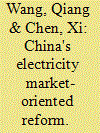| Srl | Item |
| 1 |
ID:
116921


|
|
|
|
|
| Publication |
2012.
|
| Summary/Abstract |
The market-oriented reform in electricity industry has become a global trend since 1980s. Although China's electricity industry has been reformed since 1978, the substantial reform has not been conducted until 1985. Before 1985, China's power industry had been absolutely monopolized by the central state-owned companies. The absolute monopoly has been broken since 1985, when the Chinese government opened doors for non-central state-owned investment entities and foreign investors in power supplies in order to solve the chronic power shortage. In 2002, the comprehensive electricity reform plan entitled Scheme of the Reform for Power Industry was enacted. However, implementation of this plan was delayed due to electricity supply shortages. Even worse, a new kind of monopoly has been developed under the background "the state advances, the private sector retreats" in late years. In some sense, the former absolute monopoly has transformed the current relative monopoly. We contend that the relative monopoly has reversed the market-oriented reform in China's electric industry. If the relative monopoly remains unchanged, it will be harmful to public welfare.
|
|
|
|
|
|
|
|
|
|
|
|
|
|
|
|
| 2 |
ID:
120624


|
|
|
|
|
| Publication |
2013.
|
| Summary/Abstract |
This paper studies how the evolution of market forces affects executive compensation in China's listed state-owned enterprises (SOEs) from 2000-2007. Along with the progress of market reforms we find that the level of executive compensation increases gradually and the relation between compensation and performance becomes more sensitive. However, the effect of market forces on executive compensation in SOEs is limited by CEOs' political connections. Our findings suggest that introducing exogenous market forces alone may not be sufficient to ensure the effectiveness of governance structure in a transition economy.
|
|
|
|
|
|
|
|
|
|
|
|
|
|
|
|